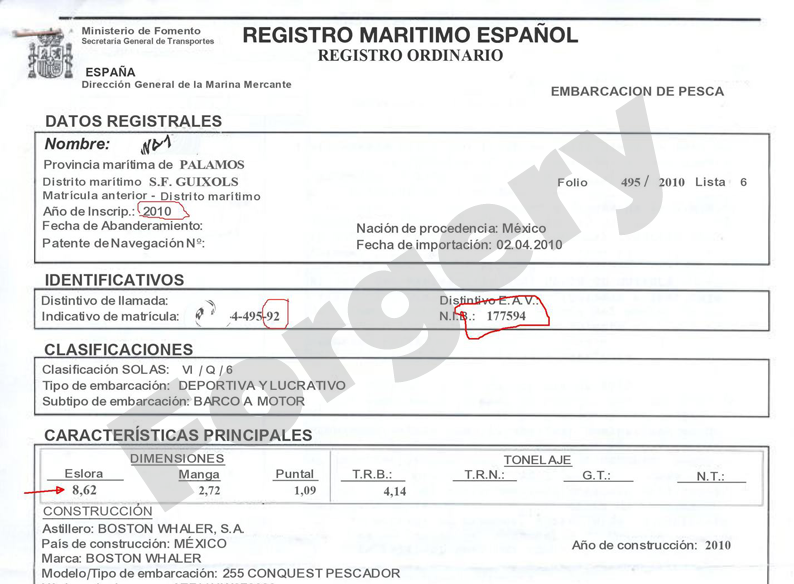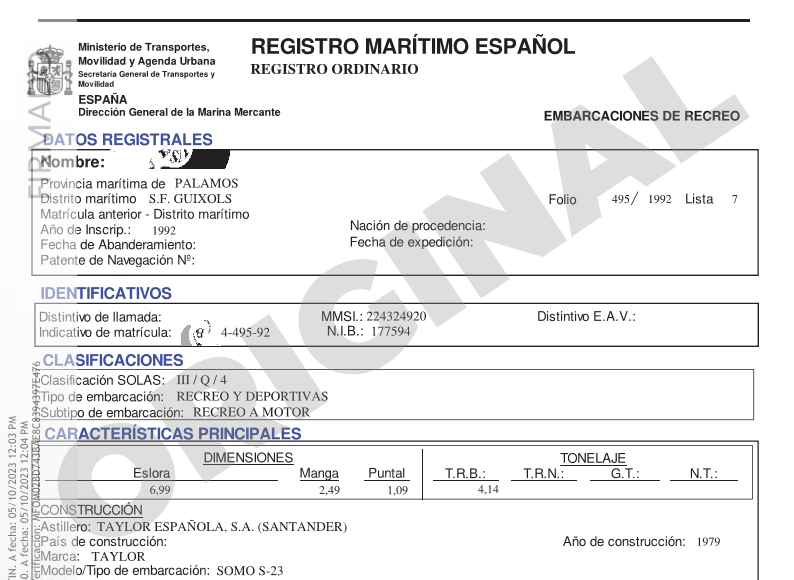If it sounds too good to be true, it probably is… there are many ways boat purchasers can be scammed during the sales process. Luckily, Guiral Nautica in Barcelona, Spain, was able to spot a boat transcript forgery before any harm came to a client.
Recently, the potential purchaser of the yacht approached Cristina Pauli, the owner of Guiral Nautico. He had been made an offer that was very hard to resist: a >9m Boston Whaler 255 Conquest Perscador from 2010 – but selling at half the typical market going price.
Fortunately, his instincts kicked in, and he decided to have our colleagues at Guiral Nautica investigate the boat paperwork. The seller had provided a transcript – seemingly from the Spanish registry – to prove the boat was registered and all was in order with it.
To the untrained eye, the documentation was spotless – but not to Cristina.
Spotting the Forgery
Seemingly an authentic document featuring all the official stamps and securities, she immediately noticed two important discrepancies. Firstly, the last two digits of the registration number – which are supposed to feature the year of the boat’s registration – ended with 92. As mentioned prior, the boat was supposed to have been registered in 2010, not 1992.
Secondly, there was information missing from sections of the transcript. Otherwise, there was little else to give away the document but enough to raise suspicion. As such, Cristina decided to contact the Spanish ships registrar directly to ascertain if the discrepancies were, in fact, simply errors or misprints.
At this point, everyone’s suspicions were proved correct when the registrar confirmed the document was a forgery. Bad and good news for the buyer, who had missed out on a too-good-to-be-true deal that was actually a scam. Deciding to get the documents checked had saved him potentially more than money, though.
The Risks & Dangers of Purchasing an Illegal Vessel
Every year, criminals and scammers target unsuspecting potential boat buyers. There are a few different reasons the aforementioned seller may have provided these falsified documents:
- The vessel was stolen or involved in a crime, so the criminals either didn’t have or couldn’t provide its original paperwork in case it revealed them.
- As the boat was manufactured in Mexico, she could have been imported illegally without import duties or VAT being paid. The seller then tried to “legalise” her with a falsified registration transcript, giving the impression that the vessel was legally imported.
- It was a scam, where criminals tried to sell a fictitious vessel to the buyer that they actually did not even physically possess.
- The boat was still on lease to the owner, as they had not yet fulfilled his financial commitments. But they tried to sell the vessel anyway. As they had not made all payments, they weren’t yet the legal owner on the paperwork, making a forgery necessary for the sale.
Now, imagine if the seller were to have priced the boat fairly and ensured the registration number and date matched. Our buyer would likely have gone ahead with the deal – perhaps even without verifying the paperwork at all.
As such, we cannot recommend getting formally issued boat registration documents checked and verified by the issuing authority enough.





- ANTONIO ADELL
reply